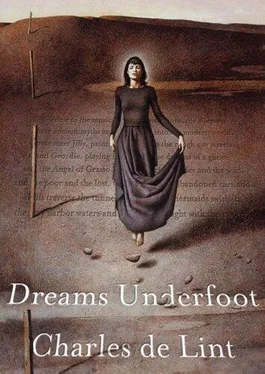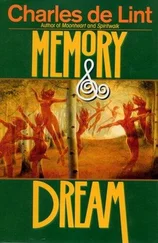“Yes, he was institutionalized as a young boy. The odd thing is that he’s somewhat aware of all the different people living inside him. He thinks that when his father sewed him back together, he used parts of all sorts of different people to do so and those bits of alien skin and tissue took hold of his mind and borrowed parts of it for their own use.”
“That ...” Harriet cleared her throat. “That was the ... accident?”
“Oh, it wasn’t any accident,” Flora said. “And don’t let anyone try to tell you different. His father knew exactly what he was doing when he threw him through that plate glass window.”
“But ...”
“Of course, the father was too poor to be able to afford medical attention for the boy, so he patched him up on his own.”
Harriet stared at the monstrous figure with growing horror.
“This ... none of this can be true,” she finally managed.
“It’s all documented at the institution,” Flora told her. “His father made a full confession before they locked him away. Poor Frank, though. It was too late to do anything to help him by that point, so he ended up being put away as well, for all that his only crime was the misfortune of being born the son of a lunatic.”
Harriet tore her gaze from Frank’s scarred features and turned to the old woman.
“How do you know all of this?” she asked.
“Why, I lived there as well,” Flora said. “Didn’t I tell you?”
“No. No, you didn’t.”
Flora shrugged. “It’s old history. Mind you, when you get to be my age, everything’s old history.”
Harriet wanted to ask why Flora had been in the institution herself, but couldn’t find the courage to do so. She wasn’t even sure she wanted to know. But there was something she had no choice but to ask. She hugged her blanket closer around her, no longer even aware of its smell, but the chill that was in her bones didn’t come from the cold.
“What happens now?” she said.
“I’m not sure I understand the question,” Flora replied with a sly smile in her eyes that said she understood all too well.
Harriet pressed forward. “What happens to me?”
“Well, now,” Flora said. She shot the monster an affectionate look. “Frank wants to start a family.”
Harriet shook her head. “No,” she said, her voice sounding weak and ineffectual even to her own ears. “No way.”
“You don’t exactly have a say in the matter, dear. It’s not as though there’s anyone coming to rescue you—not in this storm. And even if someone did come searching, where would they look? People disappear in this city all of the time. It’s a sad, but unavoida—
ble fact in these trying times that we’ve brought upon ourselves.”
Harriet was still shaking her head.
“Oh, think of someone else for a change,” the old woman told her. “I know your type. You’re filled with your own selfimportance; the whole world revolves around you. It’s a party here, an evening of dancing there, theatre, clubs, cabaret, with never a thought for those less fortunate. What would it hurt you to give a bit of love and affection to a poor, lonely monster?”
I’ve gone all demented, Harriet thought. All of this—the monster, the lunatic calm of the old woman—none of it was real. None of it could be real.
“Do you think he likes being this way?” Flora demanded.
Her voice grew sharp and the monster shifted nervously at the tone of her anger, the way a dog might bristle, catching its master’s mood.
“It’s got nothing to do with me,” Harriet said, surprising herself that she could still find the courage to stand up for herself. “I’m not like you think I am and I had nothing to do with what happened to that—to Frank.”
“It’s got everything to do with you,” the old woman replied. “It’s got to do with caring and family and good Samaritanism and decency and long, lasting relationships.”
“You can’t force a person into something like that,” Harriet argued.
Flora sighed. “Sometimes, in these times, it’s the only way. There’s a sickness abroad in the world, child; your denial of what’s right and true is as much a cause as a symptom.”
“You’re the one that’s sick!” Harriet cried.
She bolted for the building’s front doors, praying they weren’t locked. The monster was too far away and moved too slowly to stop her. The old woman was closer and quicker, but in her panic, Harriet found the strength to fling her bodily away. She raced for the glass doors that led out of the foyer and into the storm.
The wind almost drove her back inside when she finally got a door open, but she pressed against it, through the door and out onto the street. The whirling snow, driven by the mad, capricious wind, soon stole away all sense of direction, but she didn’t dare stop. She plowed through drifts, blinded by the snow, head bent against the howling wind, determined to put as much distance between herself and what she fled.
Oh god, she thought at one point. My purse was back there. My ID. They know where I live. They can come and get me at home, or at work, anytime they want.
But mostly she fought the snow and wind. How long she fled through the blizzard, she had no way of knowing. It might have been an hour, it might have been the whole night. She was shaking with cold and fear when she stumbled to the ground one last time and couldn’t get up.
She lay there, a delicious sense of warmth enveloping her. All she had to do was let go, she realized.
Just let go and she could drift away into that dark, warm place that beckoned to her. She rolled over on her side and stared up into the white sky. Snow immediately filmed her face. She rubbed it away with her hand, already halffrozen with the cold.
She was ready to let go. She was ready to just give up the struggle, because she was only so strong and she’d given it her all, hadn’t she? She
A tall dark figure loomed up suddenly, towering over her. Snow blurred her sight so that it was only a shape, an outline, against the white.
No, she pleaded. Don’t take me back. I’d rather die than go back. As the figure bent down beside her, she found the strength to beat at it with her frozen hands.
“Easy now,” a kind voice said, blocking her weak blows. “We’ll get you out of here.”
She stopped trying to fight. It wasn’t the monster, but a policeman. Somehow, in her aimless flight, she’d wandered out of the Tombs.
“What are you doing out here?” the policeman said.
Monster, she wanted to say. There’s a monster. It attacked me. But all that came out from her frozen lips was, “Muh ... tacked me ...”
“First we’ll get you out of this weather,” he told her, “then we’ll deal with the man who assaulted you.”
The hours that followed passed in a blur. She was in a hospital, being treated for frostbite. A detective interviewed her, calmly, patiently sifting through her mumbled replies for a description of what had happened to her, and then finally she was left alone.
At one point she came out of her dozing state and thought she saw two policeman standing at the end of her bed. She wasn’t sure if they were actually present or not, but like Agatha Christie characters, gathered at the denouement of one of the great mystery writer’s stories, their conversation conveniently filled in some details concerning her captors of which she hadn’t been aware.
“Maybe it was before your time,” one of the policemen was saying, “but that description she gave fits.”
“No, I remember,” the other replied. “They were residents in the Zeb’s criminal ward and Cross killed their shrink during a power failure.”
Читать дальше












